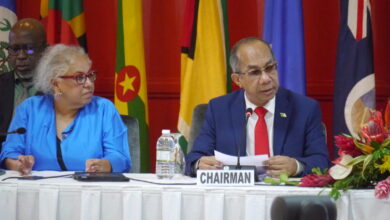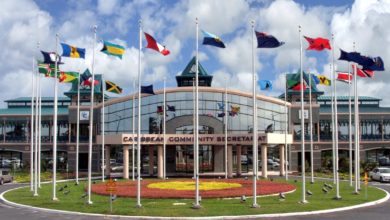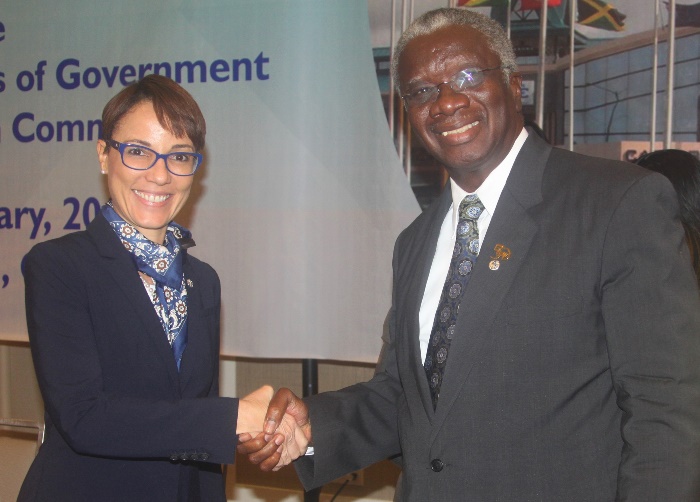|
A special good day to all.
I am very pleased to be here, to address you on behalf of the Caribbean Side of this partnership at this the Inaugural Caribbean-United States Security Cooperation Dialogue. This is an historic phase in an already strong relationship between the United States of America and Caribbean Member States. In April 2009, at the Fifth Summit of the Americas, in Trinidad and Tobago, the President of the United States made it clear that the US was seeking a new and more balanced relationship with its Caribbean neighbours through practical initiatives based on a mutually beneficial partnership and referred to a US$30M investment to strengthen security cooperation in the Caribbean Region. This investment represents a multi-year, multi-faceted joint initiative in the security domain. It is indeed an honour to say on behalf of my colleagues that the Caribbean States welcome this initiative. The US has always been an important partner assisting Caribbean States in the strengthening of their economies and security. There have been many benefits derived from the US – from security regulations to economic aid. However, there is need for a more institutionalized security arrangement between these parties, much like what is being developed between the US and Central American States. Within CARICOM, security has been embraced as the fourth pillar of the Community. Heads of Government have established a regional framework for the management of crime and security. There has been recognition of the need for the development of institutions, instruments and initiatives to treat with the issue of crime and security in the Region. An institutionalized Caribbean-US Security arrangement would therefore serve to advance and reinforce the efforts already underway as mandated by CARICOM’s political and security stakeholders, to further secure the Region through cooperative relationships with traditional and non-traditional partners, in an atmosphere further characterized by mutual respect and acknowledgement of each other’s sovereign responsibilities to our respective nationals and citizens. An Agreement such as this one also brings CARICOM one step closer to our Caribbean neighbour, the Dominican Republic, with whom we share many crime and security related concerns. Pragmatism through strategic engagement is required to ensure that CARICOM–US security cooperation works in practice. This engagement should emphasize greater cooperation and partnerships to confront common challenges. These challenges have been the basis for the development of a Comprehensive Needs Assessment matrix and the identification of the following as strategic priorities for the Region: Border Security, Crime Prevention, Crime Management, Small Arms and Light Weapons, Counter Narcotics, Counter Terrorism, Maritime and Airspace Security Cooperation, Disaster Management, Anti-Corruption, Human Resource Development, Intelligence and Information Sharing, and Criminal Deportation. The Caribbean has demonstrated its readiness to share in the responsibility for hemispheric security and reaffirms its commitment to constructing a safer hemisphere. CARICOM’s commitment and investment is demonstrated in the decisions of the Twenty Sixth meeting of the Conference of Heads of Government, held in Saint Lucia July 2005, where it was agreed to establish a Regional Framework for the Management of Crime and Security in CARICOM. The elements of the Management Structure for Crime and Security include :
These points of agreement with respect to the conceptualization, characterization, identification, prioritization and implementation of a security cooperation agenda to address the threats, concerns and challenges of the Region have been very instructive in defining the principal categories or contexts for the security cooperation engagements that will be pursued through this Joint Strategy. A new, more pragmatic and implementable approach to this engagement has been identified as a critical requirement for the success of this Joint Strategy. To accomplish this objective, the concept of implementation for the engagement mechanisms of the strategy reflects a shift from past patterns of predominantly bilateral, country to country engagements, the decision-making for which was principally based extra-regionally, and often, without Caribbean representation or involvement. The new concept also strengthens the Caribbean region’s capacity to implement already existing security cooperation instruments and initiatives and to strengthen existing national and regional security institutions. It is intended that the implementation of this strategy will also result in the institutionalization of a relevant, coherent, balanced, inclusive, multi-level and regional approach to future Caribbean – United States security cooperation, with mechanisms that are based both in the Caribbean and in the United States. Our meeting here today is as a result of many working group meetings at the technical level over the last year, to support and facilitate its implementation while ensuring an enduring impact on the Region. The Caribbean Region is faced with increasing crime and violence much of it driven by the cultivation, manufacture and transportation of narcotic drugs, illicit sales and trafficking of weapons and the trafficking of persons. It is, therefore, essential that the Caribbean States work together to coordinate their respective resources to counter the multidimensional threat to our security. It is also imperative that the Region pursues partnerships such as the one which will be finalised here on this occasion. It is a known fact that the criminal world has no borders, no bureaucracy, and a will to operate with relative impunity. We now have to respond to the threats of that borderless world through partnerships akin to that of our raison d’être today. The common threats faced by Caribbean States and the interdependencies of the actions required dictate regional cooperation and international cooperation and we are moving in the right direction in this regard. This Dialogue is indeed very timely and most appropriate since it seeks to strengthen cooperation with an understanding of mutual responsibility and mutual respect in order to secure and preserve the peace, security and socio-economic development of the citizens of the Caribbean and by extension the United States. It is heartening to note that the partnership also seeks to address both the threats and needs of vulnerable populations thereby increasing community policing, opportunities for rehabilitation of offenders and abusers, and a focus on the youth. This is yet another front on which we must fight against the increasing crime and violence levels. For those populations already engaged in illicit activity or highly at risk of engaging in such activity, the provision of sustainable alternative gainful activity is essential to reduce recidivism. An approach that addresses the causes and motivations for engagement in criminal activity is required and must go hand in hand with approaches that address the symptoms. Natural Disasters have also come to the fore within the last few years especially within the security context of the 21st century. The Caribbean has seen the need year after year to improve its preparedness, mitigation and recovery from natural disasters as well as those that are manmade, to minimise loss of life and the damage to infrastructure. No event highlighted such a need as the January 12, 2010 earthquake in CARICOM Member State Haiti, which shares a border with our Caribbean neighbour and partner the Dominican Republic. It has always been recognised that the Caribbean has the potential to become a first line of defence for the United States southern flank or the corridor through which illicit traffic flows. A positive and mutually beneficial outcome depends on the decisions made from this point on and the actions and esprit de corps chosen and pursued thereafter. The Caribbean and the US have here an opportunity to enhance the overall security of our States and hemisphere, and to secure the safety of our citizens through a Caribbean-US partnership which identifies the mutual steps required to address our common priorities and secure our States into the future.
I thank you |
|
Press ReleasesSpeeches





